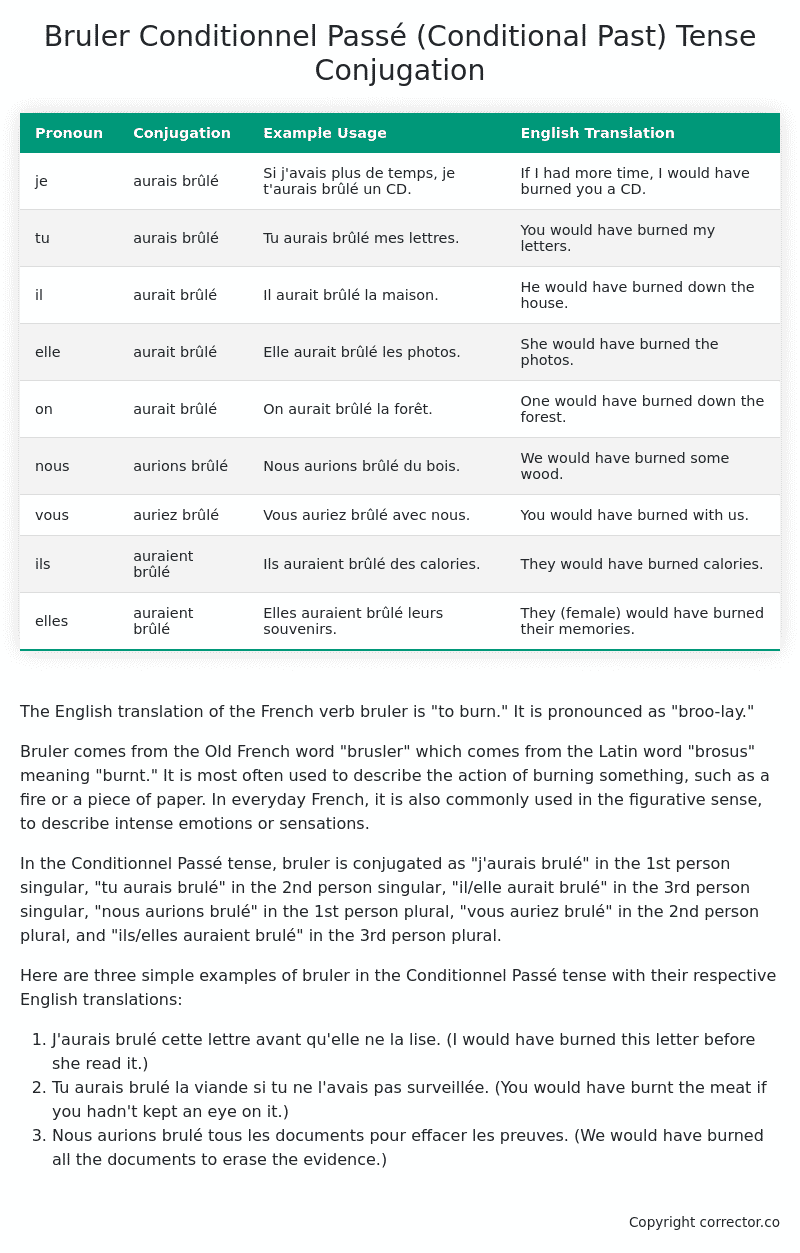Conditionnel Passé (Conditional Past) Tense Conjugation of the French Verb bruler
Introduction to the verb bruler
The English translation of the French verb bruler is “to burn.” It is pronounced as “broo-lay.”
Bruler comes from the Old French word “brusler” which comes from the Latin word “brosus” meaning “burnt.” It is most often used to describe the action of burning something, such as a fire or a piece of paper. In everyday French, it is also commonly used in the figurative sense, to describe intense emotions or sensations.
In the Conditionnel Passé tense, bruler is conjugated as “j’aurais brulé” in the 1st person singular, “tu aurais brulé” in the 2nd person singular, “il/elle aurait brulé” in the 3rd person singular, “nous aurions brulé” in the 1st person plural, “vous auriez brulé” in the 2nd person plural, and “ils/elles auraient brulé” in the 3rd person plural.
Here are three simple examples of bruler in the Conditionnel Passé tense with their respective English translations:
- J’aurais brulé cette lettre avant qu’elle ne la lise. (I would have burned this letter before she read it.)
- Tu aurais brulé la viande si tu ne l’avais pas surveillée. (You would have burnt the meat if you hadn’t kept an eye on it.)
- Nous aurions brulé tous les documents pour effacer les preuves. (We would have burned all the documents to erase the evidence.)
Table of the Conditionnel Passé (Conditional Past) Tense Conjugation of bruler
| Pronoun | Conjugation | Example Usage | English Translation |
|---|---|---|---|
| je | aurais brûlé | Si j’avais plus de temps, je t’aurais brûlé un CD. | If I had more time, I would have burned you a CD. |
| tu | aurais brûlé | Tu aurais brûlé mes lettres. | You would have burned my letters. |
| il | aurait brûlé | Il aurait brûlé la maison. | He would have burned down the house. |
| elle | aurait brûlé | Elle aurait brûlé les photos. | She would have burned the photos. |
| on | aurait brûlé | On aurait brûlé la forêt. | One would have burned down the forest. |
| nous | aurions brûlé | Nous aurions brûlé du bois. | We would have burned some wood. |
| vous | auriez brûlé | Vous auriez brûlé avec nous. | You would have burned with us. |
| ils | auraient brûlé | Ils auraient brûlé des calories. | They would have burned calories. |
| elles | auraient brûlé | Elles auraient brûlé leurs souvenirs. | They (female) would have burned their memories. |
Other Conjugations for Bruler.
Le Present (Present Tense) Conjugation of the French Verb bruler
Imparfait (Imperfect) Tense Conjugation of the French Verb bruler
Passé Simple (Simple Past) Tense Conjugation of the French Verb bruler
Passé Composé (Present Perfect) Tense Conjugation of the French Verb bruler
Futur Simple (Simple Future) Tense Conjugation of the French Verb bruler
Futur Proche (Near Future) Tense Conjugation of the French Verb bruler
Plus-que-parfait (Pluperfect) Tense Conjugation of the French Verb bruler
Passé Antérieur (Past Anterior) Tense Conjugation of the French Verb bruler
Futur Antérieur (Future Anterior) Tense Conjugation of the French Verb bruler
Subjonctif Présent (Subjunctive Present) Tense Conjugation of the French Verb bruler
Subjonctif Passé (Subjunctive Past) Tense Conjugation of the French Verb bruler
Subjonctif Imparfait (Subjunctive Imperfect) Tense Conjugation of the French Verb bruler
Subjonctif Plus-que-parfait (Subjunctive Pluperfect) Tense Conjugation of the French Verb bruler
Conditionnel Présent (Conditional Present) Tense Conjugation of the French Verb bruler
Conditionnel Passé (Conditional Past) Tense Conjugation of the French Verb bruler (this article)
L’impératif Présent (Imperative Present) Tense Conjugation of the French Verb bruler
L’infinitif Présent (Infinitive Present) Tense Conjugation of the French Verb bruler
Struggling with French verbs or the language in general? Why not use our free French Grammar Checker – no registration required!
Get a FREE Download Study Sheet of this Conjugation 🔥
Simply right click the image below, click “save image” and get your free reference for the bruler Conditionnel Passé tense conjugation!

Bruler – About the French Conditionnel Passé (Conditional Past) Tense
Formation
Common Everyday Usage Patterns
Expressing Unreal Past Scenarios
Polite Requests or Suggestions
Expressing Doubt or Uncertainty
Interactions with Other Tenses
Conditional Present
Indicative Past Tenses
Conditional Future
Summary
Want More?
I hope you enjoyed this article on the verb bruler. Still in a learning mood? Check out another TOTALLY random French verb conjugation!


